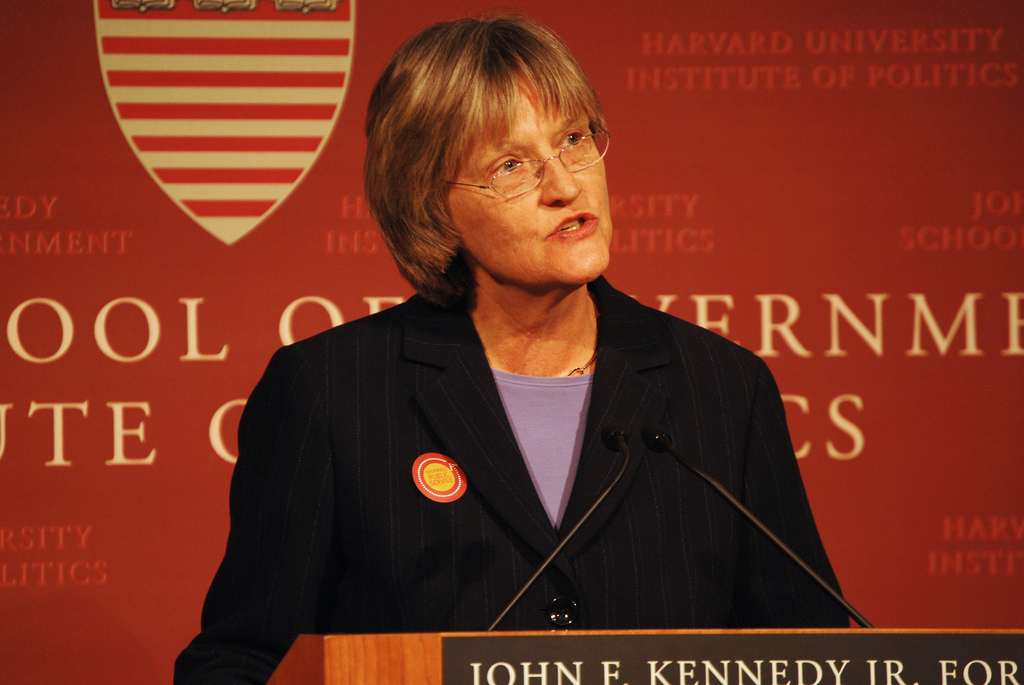
Harvard President Drew Faust is defending the value of a college degree at a time when higher education is increasingly coming under fire for not providing graduates with the skills necessary to succeed and thrive in the workforce. (Eugene Ossi/Flickr)
There's a growing skepticism in this country about whether college is really worth it. Last week, one of higher education’s heavy hitters weighed in on that national debate.
Harvard president Drew Faust kicked off the university’s campaign to make the case for college. Faust wrote an op-ed in the USA Today and then delivered a speech to high school students and teachers in Dallas.
On Campus caught up with President Faust shortly after her speech, and began the conversation by asking her why she finds it's necessary now to defend the value of college.
FAUST: There have been individuals, entrepreneurs and successful business people, who have suggested that maybe we don't need to have students go to college. That people can go directly into the highest echelons of business achievement by being entrepreneurs. And if you want to be an entrepreneur and take your products into other parts of the world, aren't you going to do a better job if you understand something about those parts of the world and have had a chance to discuss them and explore them with other students and faculty?
CARAPEZZA: Do you feel like that liberal arts education is really under attack?
FAUST: There's an understandable focus on vocation and work, and understandable worry that people express about whether students will be able to find jobs, and whether they'll be able to survive and thrive in an economy that's been quite difficult for the last several years. But that kind of anxiety should not lead us to neglect the broader purposes of higher education.
CARAPEZZA: I'm sure you hear the skepticism all the time about graduates from any college, including one with a 6 percent acceptance rate, being adequately prepared for the workforce. What is Harvard doing to make sure your students who do pretty well in the classroom are also ready for a career?
FAUST: The curriculum is meant to give students certain kinds of skills in communication and basic understand of the fields of the natural science and social science that we think will serve them well in a variety of careers. But we also encourage students to find summer opportunities. We have support for students to have internships and other kinds of work experiences and educational experiences internationally while they're at Harvard.
CARAPEZZA: Net price isn't necessarily a problem at Harvard, because of the large endowment, but do you think higher education in general is doing enough to control cost?
FAUST: We all need to attend to the imperative of controling cost. But we also need to recognize that part of the challenge for students has been the defunding of public higher education in recent years. If we look over the last 20 years, for every four dollars that go into higher education in our public system, it used to be that three dollars were paid by the states and one dollar by the students. That is now reversed.
CARAPEZZA: As the president of a private university, do you feel limited in your role in how you can help to reverse that trend?
FAUST: I feel that I have the opportunity to speak out and to make the case for college as a broad public good, and I hope that will have an impact that will extend beyond my own position in one particular institution.
CARAPEZZA: You're planning to use your bully pulpit?
FAUST: Yes, that's what the "Case for College" speech is.
For more information about youth unemployment and the difficulty of finding jobs as a recent graduate, both in the United States and abroad, check out this interview from The Takeaway.
Listen to our extended interview with President Drew Faust:










